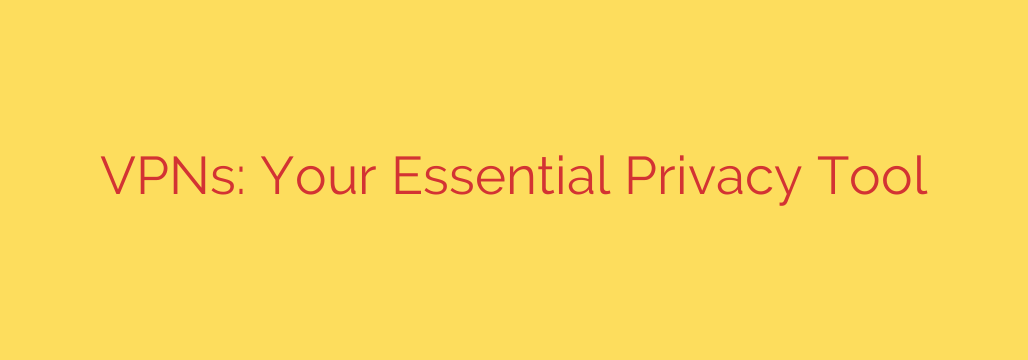
Understanding VPNs: Your Guide to a Safer, More Private Internet
In today’s digital world, nearly every aspect of our lives is connected to the internet. From banking and shopping to communicating with loved ones, our personal data is constantly flowing through networks we don’t control. This level of connectivity brings incredible convenience, but it also exposes us to significant risks, including data theft, surveillance, and loss of privacy. This is where a Virtual Private Network, or VPN, becomes an indispensable tool.
A VPN is more than just a piece of software; it’s your personal, encrypted tunnel through the public internet. Think of it as a secure, private lane on a chaotic public highway, ensuring your digital travels are shielded from prying eyes.
How Does a VPN Actually Work?
At its core, a VPN does two crucial things to protect your online activity:
It Encrypts Your Data: When you connect to the internet through a VPN, all the data traveling to and from your device is scrambled using powerful encryption. This means that even if a hacker or your Internet Service Provider (ISP) were to intercept your traffic, they would only see unreadable code. Your sensitive information, like passwords, financial details, and private messages, remains completely secure.
It Hides Your IP Address: Your IP address is like a digital home address for your device, revealing your general location and allowing websites and services to track your activity. A VPN routes your connection through one of its own private servers located elsewhere in the world. You are assigned the IP address of that server, effectively masking your real location and identity. This makes it incredibly difficult for anyone to trace your online footprint back to you.
Key Reasons You Should Be Using a VPN
Understanding how a VPN works is one thing, but knowing why you need one is what truly matters. Here are the most compelling benefits of integrating a VPN into your daily digital life.
Secure Your Connection on Public Wi-Fi
Public Wi-Fi networks in coffee shops, airports, and hotels are notoriously insecure. They are prime targets for cybercriminals who can easily monitor unencrypted traffic to steal login credentials and personal data. Using a VPN on public Wi-Fi creates an encrypted shield, making your connection impenetrable and ensuring your information stays private, even on the most vulnerable networks.
Protect Your Online Privacy from Your ISP
Your Internet Service Provider can see every website you visit, how long you stay there, and what you do. In many countries, ISPs are legally allowed to collect and even sell this browsing data to advertisers. A VPN encrypts your traffic, preventing your ISP from monitoring your activity. All they can see is that you are connected to a VPN server—the rest is hidden.
Access Content and Services from Anywhere
Many online services and streaming platforms restrict content based on your geographic location. A VPN allows you to connect to a server in a different country, making it appear as if you are browsing from that region. This enables you to access your home subscriptions while traveling abroad and explore a wider world of digital content.
Prevent Bandwidth Throttling
Have you ever noticed your internet slowing down inexplicably, especially when streaming video or gaming? This is often due to “bandwidth throttling,” where your ISP intentionally slows your connection for certain high-bandwidth activities. Because a VPN hides the nature of your traffic, your ISP cannot identify and throttle specific activities, leading to a more consistent and potentially faster connection.
Choosing the Right VPN: Essential Features to Look For
Not all VPN services are created equal. When selecting a provider, prioritize security and privacy by looking for these critical features:
- A Strict No-Logs Policy: This is the most important feature. A no-logs policy guarantees that the VPN provider does not track, store, or share any information about your online activity. Ensure the provider has a verified and audited no-logs policy.
- Strong Encryption Standards: Look for VPNs that use AES-256 encryption, which is the same standard used by governments and security institutions worldwide. It is virtually unbreakable.
- A Kill Switch: This is a crucial fail-safe feature. If your VPN connection unexpectedly drops, the kill switch will automatically block your device’s internet access until the secure connection is restored. This prevents your real IP address and unencrypted data from being accidentally exposed.
- Server Network and Speed: A provider with a large network of servers in various countries gives you more options for bypassing geo-restrictions and finding a fast, stable connection.
In an era where digital privacy is constantly under threat, a VPN has evolved from a niche tool for tech enthusiasts to a fundamental necessity for everyone. By encrypting your data and masking your identity, it empowers you to take back control of your digital footprint and browse the internet with the security and freedom you deserve.
Source: https://kifarunix.com/vpns-are-your-must-have-privacy-tool/








